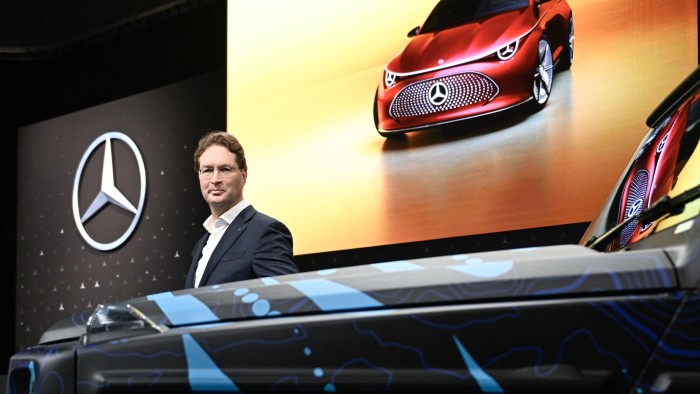Stay informed with free updates
Simply sign up to the Trade disputes myFT Digest — delivered directly to your inbox.
European carmakers have called on Brussels to strike a “grand bargain” with Donald Trump, asking lawmakers for an urgent analysis of what the incoming US president wants to avoid a bruising trade war.
Acea, the European car industry body, on Thursday sent a letter to EU leaders urging them not to retaliate against Trump’s threatened tariffs.
“The EU should seek a grand bargain with the US and attempt to avoid a potential trade conflict,” the letter, sent to the European Commission, European parliament and all 27 member states, said.
Trump pledged a blanket tariff of up to 20 per cent on all US imports during the presidential campaign, weighing on the European automotive industry at a time when it is grappling with the costly transition to electric vehicles and the rise of Chinese competition.
More than a fifth of EU car exports go to the US.
At a news conference, Ola Källenius, chief executive of Mercedes-Benz and new president of Acea, called for “a strong sense of urgency” for the EU to find room to negotiate with the incoming Trump administration.
“Make a thorough analysis of what the other side needs to do,” he said. “The blunt instrument of just simply raising tariffs stifles growth.”
The EU already imposes a 10 per cent tariff on all car imports. Commission officials say they are open to negotiation, but are prepared to retaliate against any US measures.
Despite fierce lobbying by member states not to enter a trade war, Brussels believes it may be necessary to hit back against the US president-elect. During Trump’s first term, both sides levied tariffs covering hundreds of millions of dollars in trade.
Acea’s letter also asked for a de-escalation with China, a big market, after the EU imposed tariffs of up to 45 per cent on Chinese EVs for alleged unfair subsidies.
“It is essential to recognise that trade with China and the US is the most vital for the prosperity of the European economy,” it added.
Some EU carmakers are now partly or wholly Chinese owned. Geely and SAIC, which is controlled by the Chinese state, own a fifth of shares in Mercedes-Benz.
Trump has attacked Germany for exporting cars to the US but importing very few US-made models. Some 738,436 vehicles were exported from the EU to the US in 2022, against US 271,476 vehicles imported to the EU over the same period.
European carmakers, which have factories in all three territories, fear a three-way trade war that would hurt exports just as EU market demand stagnates.
Acea said it would be better to increase the “resilience” of the industry than use protectionist tariffs.
It once again requested the commission scrap fines that will be levied this year for failing to comply with a law limiting emissions. Slowing EV sales — down 6 per cent in 2024, according to provisional figures — made them impossible to hit, Acea said.
Companies will face billions in fines or have to pay Chinese and US manufacturers such as BYD and Tesla to “pool” emissions credits, since a bigger share of their range is electric.
Several EU leaders and European parliament members have also called for the fines to be dropped or reinvested in research by the companies.
Acea said it still backed a ban on the sale of cars with combustion engines by 2035 but needed government help to comply.
According to preliminary figures released by Acea on Thursday, EVs made up about 13 per cent of new vehicle registrations last year, well below the 25 per cent policymakers had expected when the EU targets were set five years ago.
“If you work against market conditions and natural demand, it has an economic cost,” Källenius said. “There must be some recognition of these market conditions to create relief.”
Read the full article here

